Installing the technology backbone for the Olympics is, appropriately enough, an Olympian task. For the upcoming Games in Vancouver, British Columbia, Bell Canada Enterprises and Avaya decided to keep it as simple as possible.
Instead of maintaining separate networks for managing voice, data, and video traffic, the companies deployed a converged Internet protocol, IP, network that can handle all three traffic streams simultaneously. The Vancouver Organizing Committee for the 2010 Olympic and Paralympic Winter Games (VANOC) is touting the event as the first all-IP Games.
The companies say the network will provide a more efficient and streamlined solution, and that everything from logistics to communications to security should run more smoothly than in previous Games.
Making Provisions
The sheer numbers alone shed light on the enormity of the undertaking. The facilities are scattered across 15 geographically dispersed venues in Vancouver and three other cities.
Bell Canada installed about 180 miles of new fiber-optic cable paths between Vancouver and Whistler, as well as 3,000 miles of in-venue cabling. Avaya supplied the networking equipment, including Ethernet switches, Wi-Fi access points, and VoIP phones.
In all, the network will support 7,000 VoIP phones, 9,000 cell phones, 7,000 two-way radios, plus tens of thousands of laptop computers. There will be 20,000 data ports throughout the facilities, and up to 100,000 people—including VANOC officials, athletes, and members of the media—will access the network.
Unlike traditional networks, data access on an IP network is independent of location. That means staffers and team members can plug their VoIP phones or laptops into any port at any facility and it will work with the services assigned to them.
“It’s created flexible work environments not only for VANOC employees but everybody who’s participating in the games,” says David Johnson, general manager of Avaya’s Olympic programs.
Normally, getting all that equipment into the hands of the people who need them is a logistical challenge, but the all-IP network has simplified the order-taking process.
If, for example, the Russian ski team needs 100 phones, the administrator would place the order on the VANOC Web site before the event. The system automatically provisions, or assigns, the phone numbers and data port connections. When the ski team arrives, a user can simply plug his phone into any port and the network immediately recognizes it as a unit assigned to the Russian ski team.
“In past games, the provisioning cycle was literally days,” says Justin Webb, Bell Canada vice president of Olympic services. “Information about your service is given to you when you order, not way later in the cycle.”
Behind the Scenes
The IP network will also serve as the backbone for venue security. The Royal Canadian Mounted Police, which heads the Vancouver 2010 Integrated Security Unit, awarded Honeywell a $28 million contract to install and support a perimeter intrusion detection system to help secure approximately 17 miles of event perimeter. Genetec, a privately held security technology company based in Saint-Laurent, Quebec, is providing its Omnicast IP video surveillance solution as the managing platform for the perimeter intrusion detection system.
The companies declined to give details about how the system works over IP, citing security concerns. But Francis Lachance, Genetec’s Omnicast product manager, says that for a large-scale, wide-area deployment like the Olympics, IP video surveillance provides more flexibility than an analog solution.
For starters, it’s much easier to add more video cameras as needed to the IP network. IP surveillance also supports search queries for specific zones at specific times, which greatly reduces response time to a specific event. And given the dispersed nature of the venues, the ability to remotely access surveillance footage is critical.
- London Games Security Costs
“If an emergency happens, everyone responsible for security will want access to video,” Lachance says. “With an analog system, everything is hardwired and connected to a central box, and you need to be close to that system to view the video. With an IP video system, you can be anywhere in world as long as you have an Internet connection to the system and view the video.”
Spectators will also benefit from the converged network. Bell Mobility customers will be able to watch the Games live on video-enabled handsets through dedicated broadcast feeds from nine competition venues. At each venue, Bell is also installing television feeds of events from other venues. Even credit card orders at concession stands will get a performance boost from the IP network.
“Those types of transactions are segregated in terms of the way the bandwidth works so that they have a high priority to occur,” Webb explains.
Green Element
Along with providing operational efficiencies, the IP network delivers environmental benefits. At the end of a temporary deployment, Bell would normally try to reuse the cables. But given the nature of the Olympics project, that isn’t a feasible option, meaning all the cables will have to be recycled once the Games are over. But the converged IP network requires only about a third the amount of cabling normally required for this type of installation.
“If you reduce the cabling by a factor of two or three, then you’ve reduced the environmental impact of the recycling process of those cables by a factor of two or three,” Webb says. “It has the upfront advantages of less work to put it in. Then after the games, it has that added benefit that the impact to the environment isn’t as significant.”
For Johnson, the biggest impact the all-IP Games will have on Avaya is yet to come.
“We’ve put in everything it would take to run a major Fortune 500 business,” he says. “A lot of that has been rigorous scenario testing and really pushing the limits of this network so we can deliver a flawless Games. It’s actually helped us quite a bit in developing our products at the next level for our other customers.”



